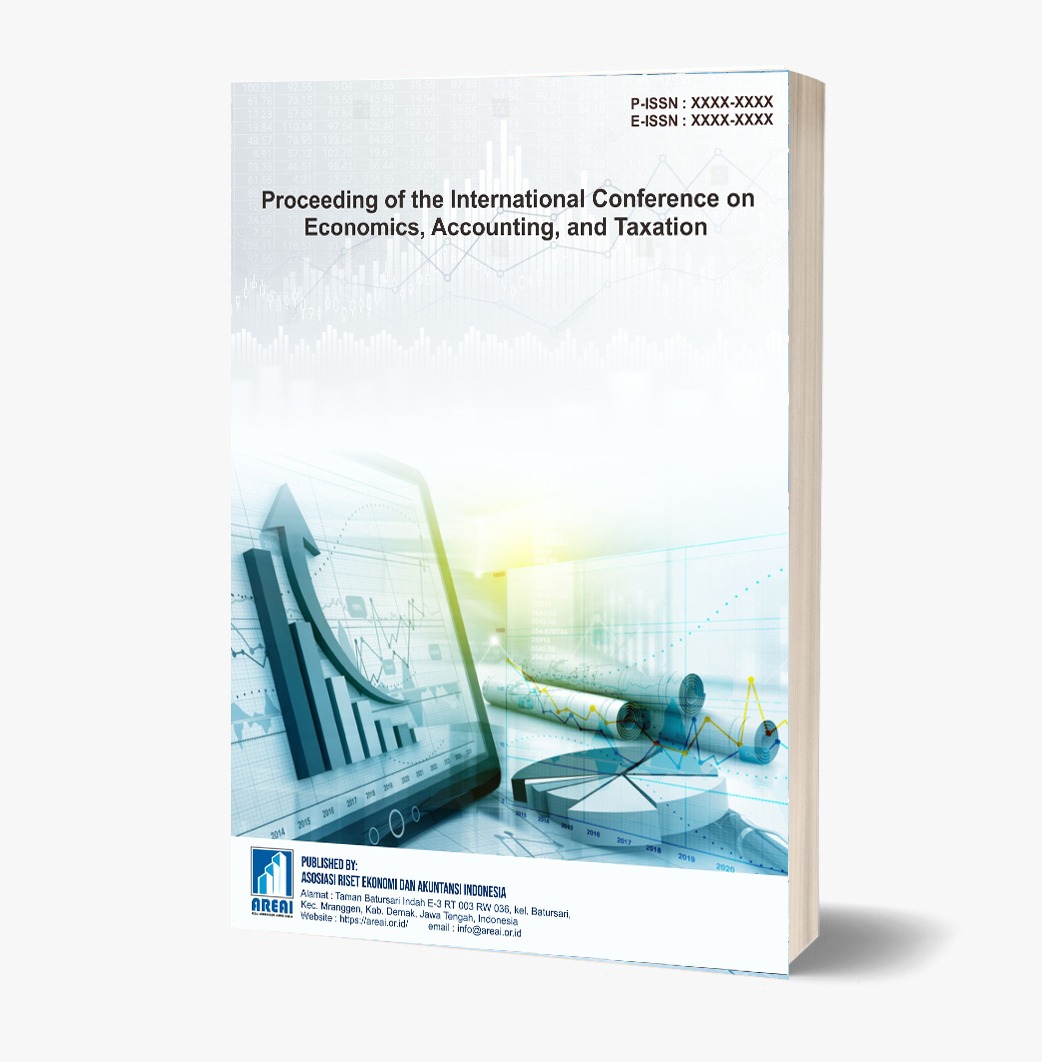Sustainable Murabahah Financing in Improving Members Welfare at BMT Insan Sejahtera Karanganyar
DOI:
https://doi.org/10.61132/iceat.v1i2.84Keywords:
BMT, Financing, Murabahah, SWOTAbstract
This research aims to (1) explain the murabahah financing system at BMT Insan Sejahtera, (2) SWOT analysis of the development of BMT Insan Sejahtera, (3) MUI fatwa regarding usury-free murabahah financing. This study uses a qualitative descriptive method. With primary and secondary data types. Data triangulation is carried out using the interview method. The results shown in the study (1) financing at BMT Insan Sejatera, present changes to the welfare of members. Based on the conclusions of the members, BMT has had a positive impact on increasing business and welfare. With amount based on murabahah financing as of January 1, 2024, to October 23, 2024, it is said to be Rp. 2,390,914,753.00 as many as 272 members, (2) The location of the current financing in the first quadrant (positive, positive) is a profitable position, which supports the implementation of an aggressive strategy (3) And that the installment payment period for murabahah financing at BMT Insan Sejatera does not affect the total price of the goods that have been agreed upon. This proves that the murabahah financing practice at BMT Insan Sejahtera does not contain usury.
Downloads
References
Akbar, E.E., (2023). Restrukturisasi Pembiayaan Bank Syariah Indonesia. Jurnal Ilmiah Manajemen Dan Kewirausahaan (JUMANAGE), 2(1), 152–157. https://doi.org/10.33998/jumanage.2023.2.1.711
Fitriyani, Y.N., Aini, Q., Afiffudin, M. (2023). Persepsi Nasabah Terhadap Keputusan Pengambilan Pembiayaan Syariah Pada KSPPS BMT Anfa’ NU Kabupaten Magelang. Jurnal Ilmiah Ekonomi Islam, 9(01), 876–884.
Gwadabe, N.A., Rahman, A.A., (2020). The role of Islamic finance in mitigating the economic impact of COVID-19 towards the attainment of maqasid al shariah: A case study of waqf institutions in Kano State, Nigeria. The Journal of Muamalat and Islamic Finance Research, 17, 59–70. https://doi.org/10.33102/jmifr.v17i3.284
Haryoso, L. (2017). Penerapan Prinsip Pembiayaan Syariah (Murabahah) Pada Bmt Bina Usaha Di Kabupaten Semarang. Law and Justice, 2(1), 79–89. https://doi.org/10.23917/laj.v2i1.4339
Imam, P., & Kpodar, K. (2016). Islamic banking: Good for growth? Economic Modelling, 59, 387–401. https://doi.org/10.1016/j.econmod.2016.08.004
Melina, F. (2020). Pembiayaan Murabahah Di Baitul Maal Wat Tamwil (Bmt). Jurnal Tabarru’: Islamic Banking and Finance, 3(2), 269–280. https://doi.org/10.25299/jtb.2020.vol3(2).5878
Nabella, S.D., Rivaldo, Y., Sumardin, S., Kurniawan, R., Sabri, S., (2023). The Effect Of Financing On Islamic Banking Assets With Non-Performing Finance As A Moderating Variable In Indonesia. Septa Diana Nabella, et.al THE EFFECT OF FINANCING ON ISLAMIC BANKING ASSETS WITH NON-PERFORMING FINANCE AS A MODERATING VARIABLE IN INDON. Jurnal Ekonomi, 12(01),pp998-1004 https://ejournal.seaninstitute.or.id/index.php/Ekonomi/article/view/1241
Nengsih, T.A., Kurniawan, B., Harsanti, E.F., (2021). Analisis Keterhubungan Tingkat Kemiskinan Dan Pembiayaan Syariah Di Indonesia Tahun 2005-2020. ILTIZAM Journal of Shariah Economics Research, 5(2), 223–229. https://doi.org/10.30631/iltizam.v5i2.1022
Pranata, M.W., Laela, S.F., (2020). Board Characteristics, Good Corporate Governance and Maqashid Performance in Islamic Banking. Journal of Islamic Monetary Economics and Finance, 6(2), 463–486. https://doi.org/10.21098/jimf.v6i1.1089
Pratama, G., Haida, N., Nurwulan, S., (2021). Strategi Penanganan Pembiayaan Bermasalah Pada Produk Bank Syariah. Ecobankers : Journal of Economy and Banking, 2(2), 101. https://doi.org/10.47453/ecobankers.v2i2.483
Putri, S., (2021). Peran Pembiayaan Syariah Dalam Pengembangan Umkm Di Indonesia. Al Hisab: Jurnal Ekonomi Syariah, 1(2), 1–11. https://doi.org/10.59755/alhisab.v1i2.67
Rahmayati, R., (2021). Competition Strategy in the Islamic Banking Industry: An Empirical Review. International Journal of Business, Economics, and Social Development, 2(2), 65–71. https://doi.org/10.46336/ijbesd.v2i2.133
Salisu, A.A., Sikiru, A.A., (2020). Pandemics and the Asia-Pacific Islamic Stocks. Asian Economics Letters, 1(1), 1–5. https://doi.org/10.46557/001c.17413
Setiawan, I. (2021). Pembiayaan Umkm, Kinerja Bank Syariah Dan Pertumbuhan Ekonomi Di Indonesia. Islamic Banking : Jurnal Pemikiran Dan Pengembangan Perbankan Syariah, 6(2), 263–278. https://doi.org/10.36908/isbank.v6i2.165
Sugianto, S., Soemitra, A., Yafiz, M., Dalimunthe, A.A., Ichsan, R.N. (2022). The implementation of waqf planning and development through Islamic financial institutions in Indonesia. JPPI (Jurnal Penelitian Pendidikan Indonesia), 8(2), 267. https://doi.org/10.29210/020221430
Suharli, S., Kara, M.H., Pagalung, G., (2022). Komparatif Pertumbuhan Pembiayaan Pada Bank Umum Syariah Ditinjau dari Penggunaanya. SEIKO: Journal of …, 5(c), 13–21. https://journal.stieamkop.ac.id/index.php/seiko/article/view/2079%0Ahttps://journal.stieamkop.ac.id/index.php/seiko/article/download/2079/1370
Wahyuni, S. F., Hafiz, M. S., & Pradesyah, R. (2023). The Effect of Contribution, Role, and Capital on MSMEs Business Development in Islamic Banks with Human Resources Quality as A Moderation Variable. Indonesian Interdisciplinary Journal of Sharia Economics (IIJSE), 6(1), 222–231. https://doi.org/10.31538/iijse.v6i1.3044
Winarto, W.W.A., Falah, F., (2020). Analisis Sistem Pengelolaan Keuangan Produk Pembiayaan Syariah Dengan Akad Murabahah. JPS (Jurnal Perbankan Syariah), 1(2), 150–161. https://doi.org/10.46367/jps.v1i2.234






